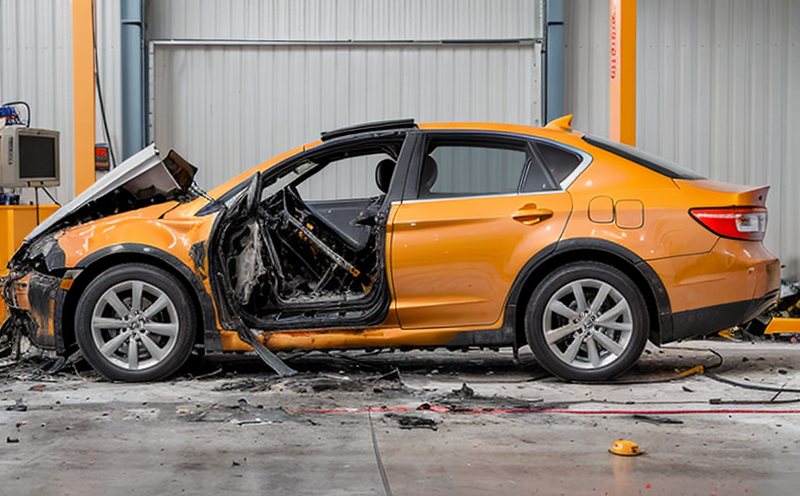IEC 62660-3 Mechanical Shock and Abuse Testing of Lithium-Ion Cells for EV Applications
The IEC 62660-3 standard is a critical component in the development, testing, and certification process for lithium-ion cells intended for use in electric vehicle (EV) applications. This standard ensures that batteries are robust enough to withstand the mechanical shocks and stresses they may encounter during normal operation or accidental situations. By complying with IEC 62660-3, manufacturers can guarantee a higher level of safety and reliability.
The testing protocol outlined in this standard involves subjecting lithium-ion cells to various types of mechanical abuse, including drop tests, vibration tests, and compression tests. These tests are designed to simulate real-world conditions that the batteries might face during transportation, installation, or operation. The aim is to identify potential weaknesses in the design and construction of the cells before they reach the market.
One of the key aspects of IEC 62660-3 testing is the use of specialized equipment capable of simulating realistic shock conditions. This includes drop towers that can simulate a battery falling from heights typical of vehicle accidents or rough handling during transport. The vibration test setup is designed to mimic the vibrations experienced by batteries in moving vehicles, which could cause internal stresses leading to premature failure.
The compression tests are particularly important for assessing the resilience of battery cells under extreme pressure conditions that might occur during a severe accident. These tests help manufacturers understand how well their products can withstand such stresses without compromising safety or performance.
Another critical element is the post-test analysis, which involves detailed examination and measurement of the test samples to determine any changes in electrical resistance, structural integrity, or other parameters that could indicate potential failure points. This information is crucial for continuous improvement in battery design and manufacturing processes.
The results from IEC 62660-3 tests are used by quality managers, compliance officers, R&D engineers, and procurement teams to make informed decisions about product development, safety enhancements, and supply chain management. By ensuring that batteries meet the stringent requirements of this standard, manufacturers can enhance the overall safety and reliability of EVs, thereby contributing to a safer transportation ecosystem.
Compliance with IEC 62660-3 is not just a regulatory requirement; it also reflects a commitment to excellence in product design and manufacturing. This standard helps build trust among consumers and stakeholders by demonstrating the robustness and reliability of lithium-ion cells used in EVs.
Eurolab Advantages
At Eurolab, we pride ourselves on providing comprehensive testing solutions that meet stringent international standards like IEC 62660-3. Our state-of-the-art facilities and experienced team ensure accurate and reliable test results every time.
- Expertise in Battery Testing: With years of experience in the field, Eurolab's technical staff are equipped to handle all aspects of battery testing.
- Comprehensive Equipment: We have access to high-quality equipment that can simulate various real-world conditions accurately.
- Accurate Reporting: Our reports provide detailed insights into the performance and durability of your batteries under different test scenarios.
- Confidentiality: All data and results are kept strictly confidential, ensuring that sensitive information remains secure.
We work closely with our clients to ensure that their products meet not only local but also international standards. Our commitment to excellence means you can trust Eurolab for all your testing needs in the battery industry.
Why Choose This Test
- Enhanced Safety: By simulating real-world conditions, this test helps identify potential hazards early on.
- Improved Durability: Ensures that batteries can withstand harsh environments and rough handling.
- Compliance Assurance: Meets the requirements of international standards like IEC 62660-3.
- Competitive Edge: Demonstrates a commitment to quality, enhancing brand reputation and market position.
The IEC 62660-3 test is crucial for ensuring the safety and reliability of lithium-ion cells used in electric vehicles. It provides valuable data that can be used to improve product design and manufacturing processes continuously. By choosing this test, you are investing in your brand's future success.





